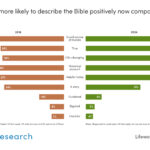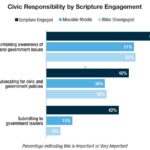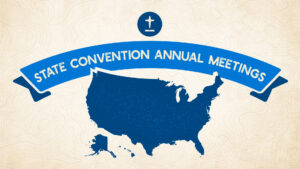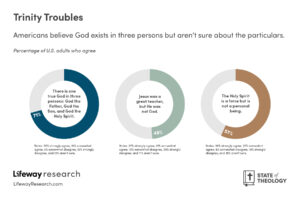
GLENDALE, Ariz. (BP) – Only 66 percent of American Christians accept the biblical teaching that all have sinned, George Barna said in the latest release from the 2025 American Worldview Survey he overseas at Arizona Christian University (ACU).
Most Christians, 72 percent, also believe people are “basically good at heart” and “should not be pejoratively characterized as sinners,” Barna said, revealing confusion among Christians regarding the biblical concept of sin.
“Only 14 percent of self-described Christians hold a biblically consistent theology of sin,” Barna, director of research at ACU’s Cultural Research Center (CRC), said of the findings released in two parts Sept. 4 and Sept. 16. “While most adults acknowledge that sin exists, many reject the truth that all have sinned and fall short before God. This misunderstanding strikes at the very heart of the Gospel message.”
Among the larger population, 52 percent believe everyone has sinned, Barna said, with more than 70 percent saying people should not be characterized as sinners because they are basically good at heart.
“And by believing people are ‘basically good at heart,’ the overwhelming majority of Americans (75 percent) blur the seriousness of sin,” Barna wrote of the findings. “In fact, the perspectives that most Americans have on sin are riddled with both logical and theological inconsistencies.”
The findings come from the second of those two waves of research in the 2025 American Worldview Survey conducted by the CRC among a national, demographically representative sample of 2,000 adults at least 18 years old. Researchers examined trends in beliefs about God, truth, sin and salvation in hopes of understanding key aspects of American faith and providing insights to strengthen Americans’ biblical worldview. The second wave of research was conducted in May.
Among key findings:
- 95 percent of self-identified Christians believe sin exists, 60 percent believe they are sinners, 66 percent believe everyone has sinned, and 72 percent believe people are basically good at heart.
- 73 percent of Protestant churchgoers believe everyone is a sinner, compared to 57 percent of Catholics.
- Among Protestants, 70 percent of mainline church attendees said they personally sin, followed by 69 percent of those attending independent or non-denominational Christian congregations, 61 percent of attendees of Evangelical churches, and 55 percent of adults attending charismatic or Pentecostal churches.
- In the larger population, adult members of Gen Z (18- to 24-year-olds) are least likely to believe everyone sins, polling at 41 percent; followed by Millennials, 49 percent; Gen X, 53 percent; and Baby Boomers, 57 percent.
- In the larger population, 62 percent of Blacks believe everyone has sinned, followed by 51 percent of whites, 50 percent of Hispanics and 28 percent of Asians.
“Taking refuge in the idea that other people have a sin problem, but they personally do not, or that sin is an outdated concept, are harmful strategies,” Barna said. “Parents, pastors, and religious influencers have a vital responsibility to keep basic biblical truths before the Christian body, including the reality of sin and its repercussions.”

The church loses its power and authority when its understanding of and response to sin are not distinct from the culture, Barna said.
“As our nation is reeling from the tensions and sadness heightened by recent episodes of political violence, suicides, rampant crime, and other threats to our way of life and existence, the opportunity for the Church to restore sanity and security by unashamedly proclaiming the truths conveyed in the Bible is undeniable,” Barna said. “The only question is who will be bold enough to steadfastly share God’s truths with a people who so desperately need His forgiveness and loving guidance.”
About two-thirds of American adults identify as Christian. Barna identifies six beliefs as central to the Christian narrative: Sin is real, every person who has ever or will ever live is a sinner, every Christian is a sinner from conception, the only solution to the eternal consequences of sin is the forgiveness for those sins extended through the death and resurrection of Jesus Christ; and that people are not good at heart but are corrupt by nature, which causes their sinful behavior against God’s will and standards.
Three additional releases are scheduled from the 2025 survey, the research center said. Find details of Barna’s research here.




















